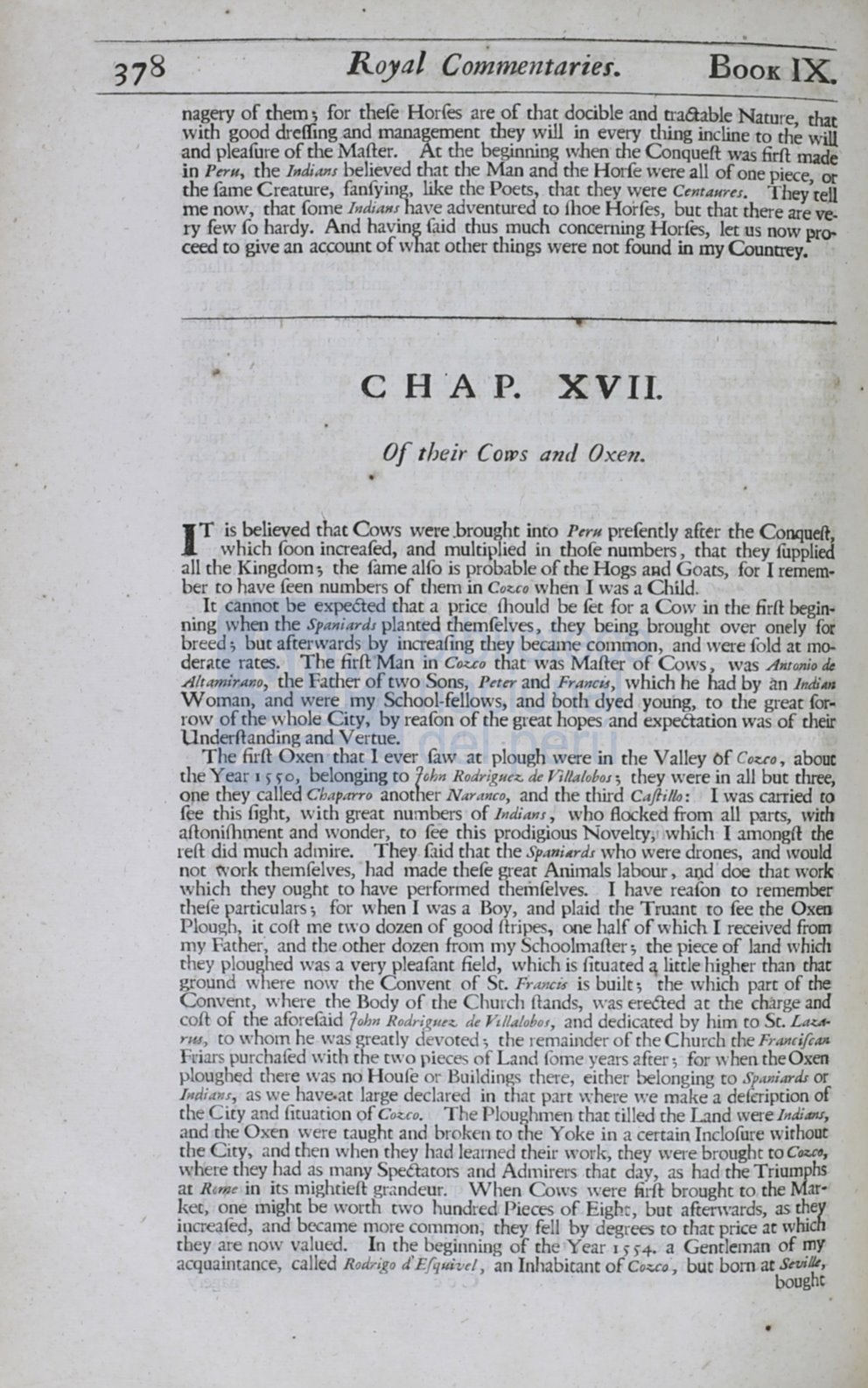

I
•
Royal Commentaries.
BooK
IX
nagery of them; for thefe Horfes are of that docible and trafuble Nature
that
with good dreffing
and management
they
will
in
every
thing
incline to
th~
will
and pleafure of the Mafrer.
At
the beginning when the Conqueft was
firfi
made
in
Peru,
the
Indians
believed
that
the
Mao
and the Horfe were
all
of one piece
or
the fame Creature, fanfying, like the Poets,
that
they were
Centatr,es.
hey'
tell
me now, that fome
Indian.r
have adventured to fhoe Horfes, but that there are ve.
ry
few
fo
hardy. And having faid thus much concerning Horfes, let us now
pro–
ceed to give
an
account of what ocher
things were
not found
in
my
Conntrey.
I
CH .AP.
XVII.
Of their Cows and Oxen.
1
1
is
believed that Cows were
~brought
into
Peru
prefently
afrer
the Conqueft,
which foon
increafed,
and multiplied
in
tbofe numbers, that they
fupplied
all
the Kingdom; the
fame
alfo
is
probable of the Hogs aRd Goats,
for I remem–
ber to have feen numbers of them
in
Co~co
when
I
was a Child.
It cannot be expetted that a
price
fhould be fee for a
Cow
in
the firll:
begin–
ning when the
Spaniard.!
planted themfelves, they
being
brought over onely
for
breed; but afterwards by increafing they became common, and were fold at mo–
derate rates. The
firfi Man
in
Co~o
that was Mafier of Cows , was
Amonio
~
Altamirano,
the Father of two Sons,
Peter
and
Francu,
which he had by an
JndiAn
Woman, and were
my
School-fellows, and both dyed young, to the great for·
row of the
hole
City,
by reafon of the great hopes and expeetation was of
their
Underfianding and
ertue.
The firfi Oxen that
I
ever
faw
at plough were
in
the Valley
of
Couo,
about
the Year
1) )O,
belonging to
rohn
Rodrigue:z:. de VillaloboJ;
they were in
all
but three,
one they called
Chaparro
another
N aranco,
and the third
Caftillo:
I
was carried to
fee this fight, with great numbers of
Jndian.r ,
who flocked from
all
parts,
with
afl:oniiliment and wonder, to fee chis prodigious Novelty, which
I
amongll:
the
reft
did much admire. They faid that the
Spani1trd.r
who were drones, and
would
not work themfelves, had made thefe great Animals labour, aQd doe
that work
' hich they ought
to
have performed themfelves.
I
have
reafon
to
remember
rhefe particulars; for
hen
I
as
a Boy, and plaid the
Truant
to fee the
Oxen
Plough, it
coll
me two dozen
f
good fidpe , one half ofwhich I received
from
my
ather,
and
the other dozen from my choolmaller; the piece of
land which
they
laughed wa a very pleafant
field,
which is fituared
4
litde higher than
chat
ground
here
no~
the Convent
f
t.
Francu
i
built; the
which
part of
the
C onvent, where the Body
f
the
hur
h
fland
wa
ereded
at
the
charge
and
coft of the afore[aid
[ohn Rodrigue
de Ytllalobo1,
and
dedicated by him
to
t.
LM:A·
nu,
to
\it:hom he
was
greatly
oted; the remainder of the
Church
the
Fr anci[clllf
riars
purchafed
i
th
the
cw
iece
f
Land
fi
me years after ;
for \
'hen the
Oxen
ploughed there\ as n Hou[e
r
uildiog there either belonging
to
paniards
or
I ndians,
as~
e ha e-at large decl
r
d
in that
part Yhere \Ve make
a
defaiption
of
the City and fituation of
Coz,co.
he
loughmen that tilled the Land
were
Indians,
and the Oxen were caught and br
k
n to the
oke in a certain Inclofure wirhoot
the
ity,
and then\ hen they had learned their '' ork, they" ere brought to
Cozc~,
here they had as many pe<ors and Admirer that day, as had the Triumphs
at
RGme
in
it
mightieft gr ndeur. When
o '
\\ere
fuft
brought
to
the
Mar·
I
et,
one might be
orch
n:
o hundr d Pieces of
Eigh ,
bat afterwards,
as
t~ey
incr
afed,
and
became more omrnon, they fell by degrees
to
that
price
at
which
they are no"
lu d.
In the b ginnin of the
ear
I
5
5"
4.
a Gentleman of
1!1Y
acquaintance, called
Rodrigo d' fquivel,
an Inhabitant of
Co<;,eo ,
but born at
Sew"4h,
boag
t
•














